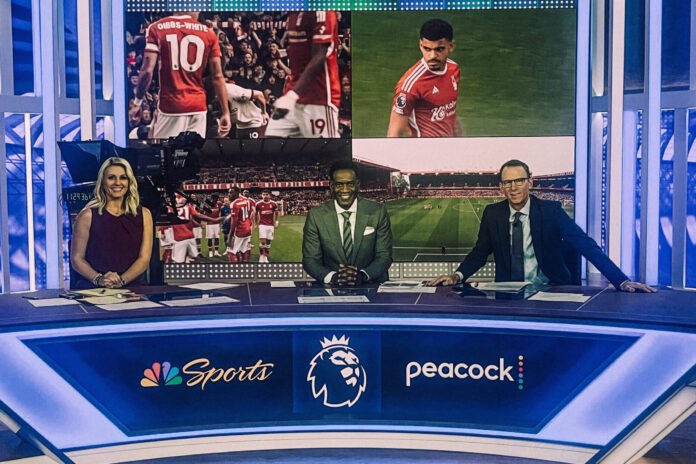“Are you kidding me?” asked Anne Hathaway, grinning besides her co-star Nicholas Galitzine while promoting their new film The Idea of You.
The reason for an Oscar-winning actress’s giddiness? That would be Leandro Trossard, the Arsenal forward, who prepared a video message after Hathaway’s support of the Premier League club went viral last week when she celebrated news of his goal against Chelsea in the middle of a press junket. Taking in Trossard’s clip during an interview on NBC’s Today show on Monday morning, Hathaway placed her hands over her mouth.
“No, no, I am shaking,” she said.
Within hours, the clip had been viewed millions of times. For the Premier League, played an ocean away from the NBC News studios in Manhattan, this is the type of high-wattage Hollywood engagement of which former chairman Richard Scudamore could only dream when he first sold the top flight of English football’s American media rights to NBC in 2013.
That contract was worth $250million (£199.1m at current rates) for three seasons, an annual cheque that more than quintupled by the time NBC secured exclusive coverage in the United States for the third consecutive time — a six-year $2.7billion agreement from 2022-23 to show all 380 Premier League games.
Anne Hathaway and Nicholas Galitzine get a sweet surprise from @Arsenal’s Leandro Trossard @LTrossard! 🤩 pic.twitter.com/oqJslG86X9
— TODAY (@TODAYshow) April 29, 2024
The investment and exposure by the broadcaster, which spreads its matches between NBC, cable’s NBC-owned USA Network and streaming service Peacock, has turbocharged the growth and earning potential of Premier League clubs. In March, the game between title rivals Manchester City and Arsenal drew a record U.S. audience of 2.12million and the six most-watched Premier League matches in U.S. history have all aired within the past 16 months.
Little wonder that last year, the Premier League opened a New York office, or that investors ranging from Hollywood to Wall Street seek a slice of the pie.
Over half the clubs in the Premier League now have American investors and more than a third of the 92 professional teams in England’s top four have some form of U.S. ownership. NBA star LeBron James has money invested in Liverpool and NFL icon JJ Watt is at Burnley. Manchester United, Manchester City, Arsenal, Chelsea, Liverpool, Aston Villa and Bournemouth have already confirmed pre-season trips to North America.
Rebecca Lowe, the studio anchor of NBC’s coverage, tells The Athletic: “I used to feel so much pride when I saw a Premier League shirt in America. The Premier League was a little bit, ‘If, you know, you know’, almost whispering. That has changed. Partly, it is the exposure and the quality of the football.
“But then, if an athlete or an actress or a pop star thinks something’s cool, the world follows. And that is happening.”
Over the past week, NBC has opened its doors to The Athletic. Jon Miller, the network’s president of acquisitions and sponsorship, explains how NBC overcame scepticism from leading Premier League owners to strike a deal in 2013 and how his team had to “pony” up to fight off rivals in 2021.
He details how he felt about the European Super League proposals in 2021 and whether the Premier League’s value is impacted by investigations and points deductions against its own clubs. Most boldly, he says he will “continue to push” the Premier League to bring its first competitive games across the Atlantic.
As the Premier League title race gathered pace last Sunday, executive producer Pierre Moossa provided a front-row seat in the production room at NBC Sports’ 32-acre International Broadcast Centre in Connecticut.
Presenter Lowe and pundits Robbie Mustoe and Robbie Earle detailed the secrets of their on-air success. For the four of them, it has been an 11-year love affair that has seen NBC present Premier League coverage from iconic American sporting locations, including the Super Bowl and the Kentucky Derby, while thousands of Premier League supporters have turned out at fan festivals across eight cities.
And then there’s the story of how NBC’s first promotional campaign for the Premier League inadvertently launched the Ted Lasso phenomenon.
Mustoe, Lowe and Earle at half-time of their coverage from the City Ground (Adam Crafton/The Athletic)
Miller was first awoken to the Premier League’s burgeoning popularity by his son Robbie almost two decades ago, as a 17-year-old who would get up at 7am to watch Tottenham Hotspur.
“It’s hard to get 17-year-olds to do much of anything — yet he’s up at 7am to watch a soccer game,” says Miller. “Then, when I came home from golf at midday, not only would he be there still watching but all his friends would be over. Then they would all play on FIFA (the video game) when the matches were over. It stuck with me.
“When I took over programming for what became NBCSN, we had a lot of hours to fill and I remembered Robbie’s passion. From 2011, we commenced conversations with the Premier League about what could be possible.”
The Premier League’s previous three-year deal with Fox, partially sub-licensed to ESPN, had been worth $80million, so a $250million package more than trebled the value. Scudamore received the pitch at 30 Rockefeller Plaza in Manhattan. He says Premier League clubs were “very reluctant”. Miller jokes that some owners, such as Manchester United’s Joel Glazer and Arsenal’s Stan Kroenke, had “drunk the ESPN Kool-Aid”.
Scudamore says: “I remember getting some serious advice from American owners that we should never take the Premier League from the holy grail of ESPN but when I started discussions with NBC, what was fascinating to me was I was selling to them but they were equally keen to present their credentials to us. They said they wanted to dedicate themselves to being the home of the English Premier League. They said they did not really want any other football leagues.”
NBC has stayed true to that pledge. It broadcasts football as part of its Olympic Games coverage and secured the Women’s World Cup last year, but NBC does not have Major League Soccer, other European football leagues or the Champions League.
“We do not want to be the network of soccer, we want to be the network of the Premier League,” Miller says. “To do the best job for the Premier League, it’s incumbent upon us to stay committed to one property.”
The Premier League appeals partially because of the time slot, as Saturday and Sunday mornings are unchallenged by U.S. sports. NBC has other significant sports properties: NFL’s Sunday Night Football, golf’s U.S. Open, Ryder Cup and Open Championship, the Kentucky Derby, college football with Notre Dame and the Big Ten, as well as NASCAR and the Indy 500. Miller is reluctant to take on more within soccer because it would mean promoting against the Premier League.
“I’m dancing with the girl who I brought to the dance and that’s who I want to be with,” he says.
After securing the first Premier League deal, Miller flew to London to present to all 20 Premier League owners, reassuring them with a bold programming commitment and ambitious marketing plans. A giant billboard sprang up in New York’s Times Square, featuring Gareth Bale, Tottenham Hotspur’s superstar at the time. Subway carriages were wrapped in the livery of Liverpool and Everton.
Ted Lasso was born in an NBC promotional advert for the Premier League. The coach, played by actor Jason Sudeikis, was hired as the new head coach of “the Tottenham Hotspurs”, asking to speak to the Queen and telling a press conference his team would play hard for all “four quarters”. It has now been viewed 21 million times.
“We did one promotion where he goes to Tottenham and sadly gets fired,” says Miller. “And then we did it again, in our third season, where after he’s been fired, he comes to work for NBC as a pundit on our Premier League games and works alongside Rebecca Lowe. And then in 2016, they came up with this idea to do the Ted Lasso sitcom that Apple TV+ acquired.
“It became one of the best shows in television history and I’m proud to say that it wouldn’t have happened had we not green-lighted the promo campaign.”
Ted Lasso and its impact on world football…
If the promotion was tongue-in-cheek, the coverage was anything but. NBC tripled the Premier League’s viewing figures in three years, Miller says, averaging 39million viewers per season by 2016.
Scudamore describes Pierre Moossa, the coordinating producer, as “a genius”, praising his “attention to detail and his passion”. In the production control room, Moossa is one of four individuals seated on the front row. He leads with laser-like focus, liaising with his presenters in the studio and guiding the commentary team on location in England. In front of him is a blur of screens and monitors.
“The nerves are what makes it fun,” he says. “If somebody says they don’t get nervous, they’re either lying or they don’t care. And I don’t know anybody in live television who doesn’t care.”
Alongside him is Joseph Givens, the technical director nicknamed ‘buttons’ (because he commands hundreds of luminous buttons) and Zeke Ouellette, the associate director who handles timing, studying a stop-clock intently and counting down to and from ad breaks to ensure commercials receive their slots. Jen Morrison is the director completing the front row.
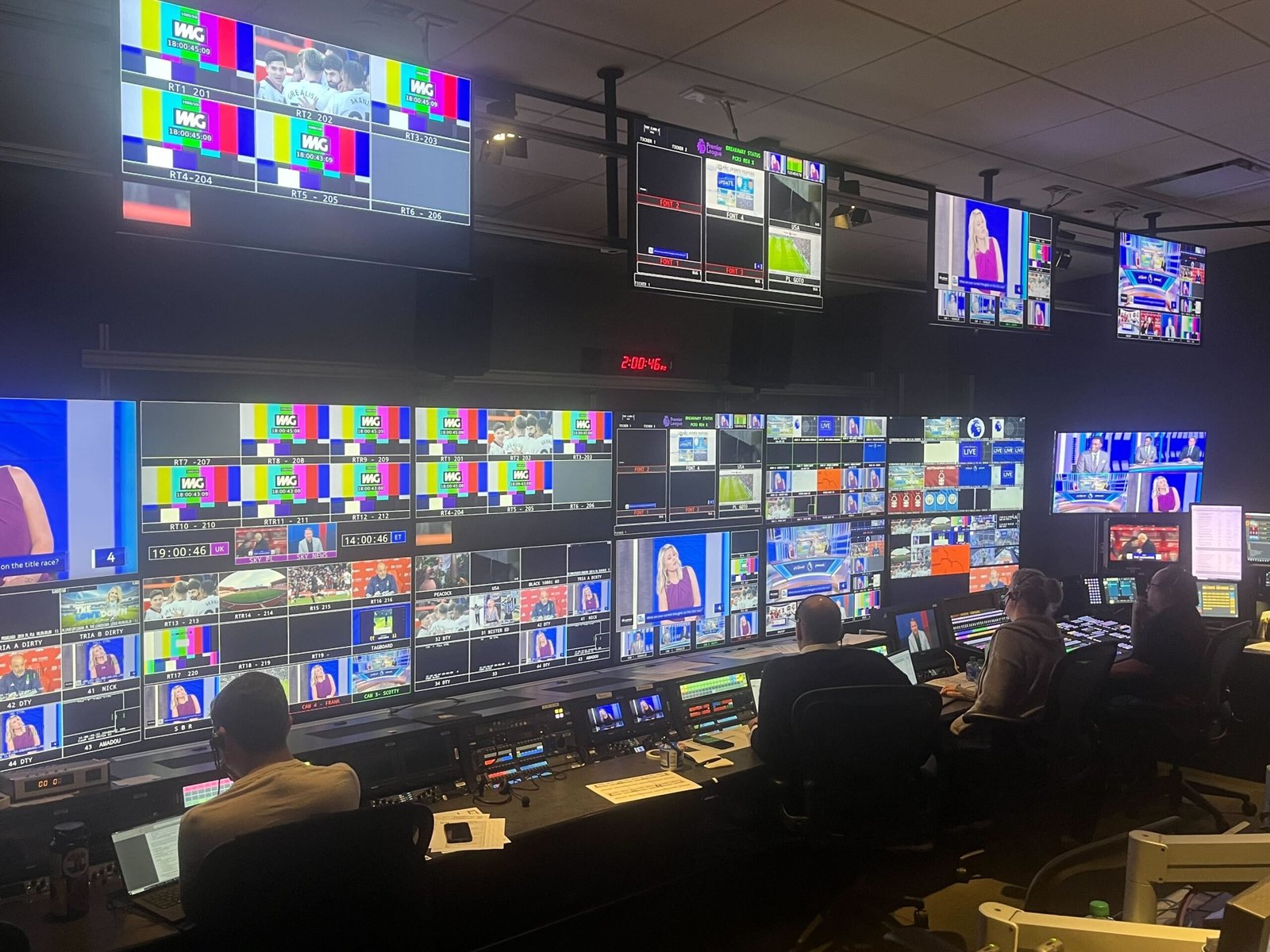
Ouellette, Moossa, Morrison and Givens in the control room (Adam Crafton/The Athletic)
Studio anchor Lowe previously worked for the BBC in the United Kingdom and became the first female presenter of an FA Cup final on British television when she anchored the 2012 edition for ESPN. Significantly, NBC mostly uses English commentators and analysts, such as Jon Champion, Peter Drury, Graeme Le Saux and Lee Dixon. The network avoids any temptation to unnecessarily dramatise (or perhaps ‘Americanise’) the coverage, when the games already provide so much drama. “Nothing should get in the way of the game,” Moossa insists.
Even the presentation on screen needed to adapt between American and English sensibilities, particularly in the vocabulary used to describe the sights and sounds of Premier League football. To be authentic to English football, NBC commentators and pundits say “table” instead of “standings”.
The table is presented, left to right, in a win-draw-loss format, as you would see in England, rather than win-loss-draw. They refer to a commentator rather than a play-by-play announcer, a pundit rather than a studio analyst. The gantry is where the commentator resides, rather than an announcers’ booth. Other words are left open to whatever is more natural to the person speaking, so if Lowe is talking, she refers to “a penalty kick”, “the touchline” and “the pitch”, while former U.S. international goalkeeper Tim Howard may say “PK”, “sideline” and “the field”.
On air, small tweaks are required to welcome new viewers but it needs to be managed carefully so as not to alienate those who are by now familiar. Lowe says: “Pierre will remind us how right now in the title race, there’s going to be lots of new eyeballs, so don’t alienate them by being all Inside Baseball, which is a show that’s very, erm, inside baseball. I will often use the phrase, ‘As you may know’, which allows me to include new people without irritating regulars.”
Moossa adds: “When you say, ‘Arsenal’s under the cosh’, you would know exactly what that means but not everybody else knows what that means. So instead of saying, ‘For those who don’t know what that means’ and make them feel silly, you just say, ‘Arsenal’s under the cosh, under a lot of pressure. By repeating yourself or adding something, you’re educating people. For those of us who have watched the NFL for many years, John Madden would explain the zone read to the most intelligent NFL fan and to people learning it at the same time.”
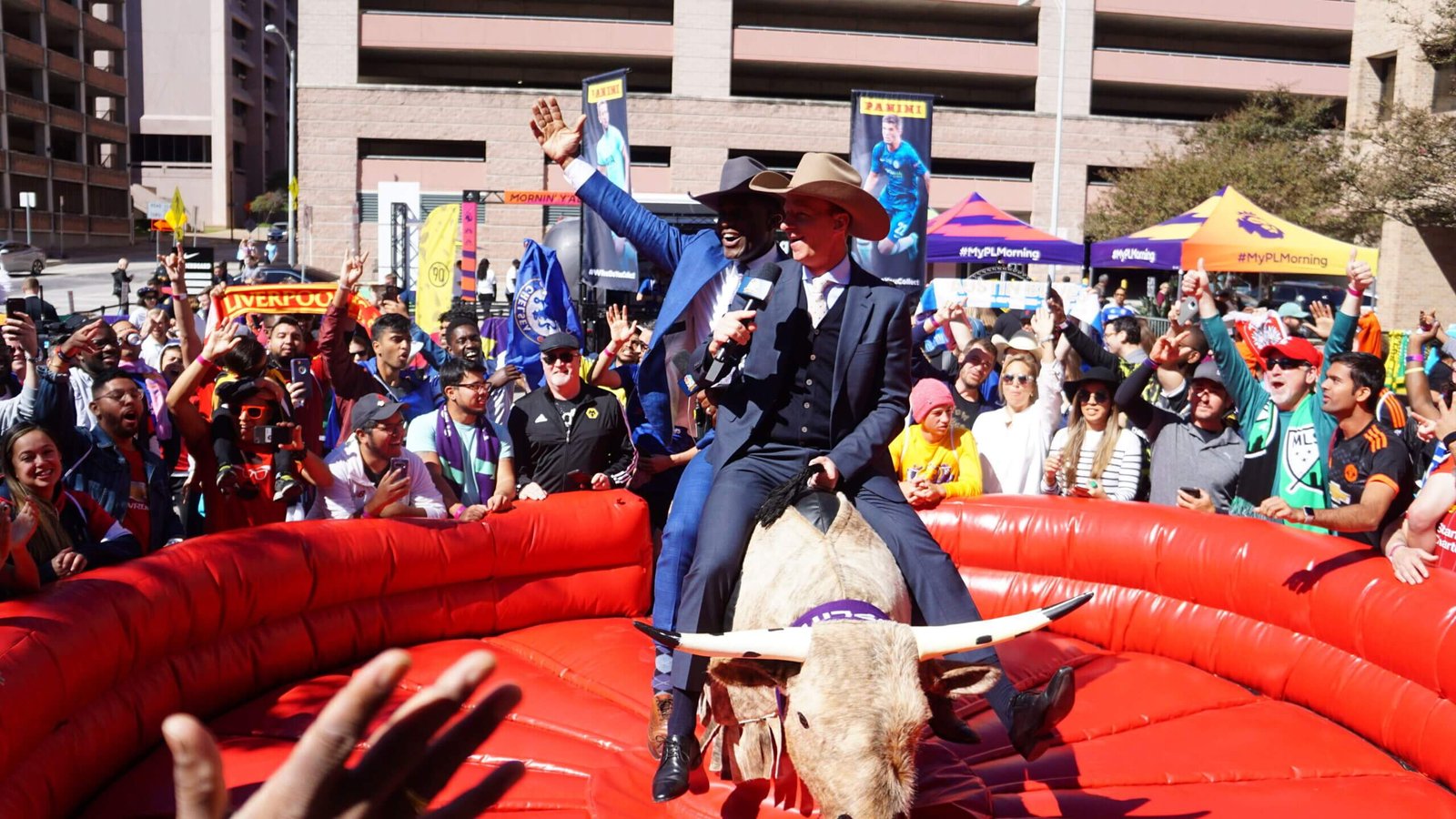
Mustoe and Earle ride a mechanical bull at a fan festival in Austin (Nick Casanova/NBC Sports)
Lowe was joined on NBC in 2013 by Mustoe and Earle, who previously appeared together occasionally on ESPN. Both had good Premier League careers in the 1990s at Middlesbrough and Wimbledon respectively, but neither were major trophy winners or played at the most popular clubs, yet they have endured and thrived for over a decade.
Mustoe lives a short drive from the studios, while Lowe and Earle fly in weekly from California. Earle says he was touched when one father came up to him recently to thank him for providing an activity he could share with his children on weekend mornings. NBC has made a virtue of the early kick-offs, encouraging families to share pictures of their children and pets from their homes as part of their #MYPLMorning social media strategy.
“They’ll send their breakfast in and Rebecca will judge them,” says Moossa. “And she’s very, very judgy on breakfast.”
The hosts assumed celebrity status. Lowe jokes that she was recently interrupted in a supermarket while “buying milk, in my yoga outfit” as a shopper asked whether she was, in fact, Rebecca Lowe. “Could you imagine being a Taylor Swift or even a regular Hollywood actress?” she laughs.
In 2015, Mustoe and Earle presented their Premier League coverage from the Super Bowl in Arizona and a hulking man stopped the pair in the security line at the airport to thank them for their coverage. It was only when Earle went to buy a bottle of water from the store several minutes later that he realised the man with whom he had just spoken was JJ Watt, the legendary NFL defensive end, whose face was staring back at him from the front cover of a magazine alongside pop star Katy Perry.
“I wasn’t an international player but wow, a lot of people know who we are,” Mustoe says. “It’s just nice, if I’m being honest.”
They have bought into American culture. At the recent Premier League Fan Fest in Nashville, Mustoe, Earle and Howard performed a lip sync of a country song for an opening sequence. During a previous festival in Austin, Mustoe and Earle rode a mechanical bull.
Kicking the weekend off, Nashville style. 🤠 pic.twitter.com/QLDi7AaEzy
— NBC Sports Soccer (@NBCSportsSoccer) April 6, 2024
But they take their work seriously. Their alarms go off at 4.30am on matchday and the days can be into double-digit hour shifts on air. They are editorially strong, following every plotline, this weekend focusing on Nottingham Forest’s grievances against Premier League referees. Lowe says: “You need to have authentic chemistry to last on set for 11 hours. You wouldn’t get through it if there was any idiots or wallies or numpties. We genuinely care about each other and a lot of it is because we started on day one all together.”
As NBC show every Premier League game — there is no 3pm Saturday blackout rule like there is in the UK — there is limited time for match analysis between games and the coverage also seeks to make sure that all 20 teams are discussed over a matchday. After every show, every staff member — on-air and off-air — will receive feedback on their performance, a phenomenon Lowe, Mustoe and Earle say is unique compared to what they had experienced in the UK.
Mustoe says: “Everybody’s accountable for every single second. We have learned that every second counts because there’s so little minutes in between games or elements of the show.”
Earle interjects: “I remember Ian Wright came to our one of the fan festivals and him saying he would find it hard because he’s a real storyteller. It wouldn’t work within the time scope.”
In 2021, NBC signed up with the Premier League for the third time but the $450m-per-season deal was up from $183million for the previous six years — and the network found itself at risk of losing its coverage.
The Premier League had some doubts about NBC’s plans to place games behind the new Peacock streaming service and rival bids landed. A joint offering from CBS and ESPN, and a double-pronged approach by Fox and Amazon, placed NBC under pressure.
Miller insists NBC was not the highest bidder at the table. “We were very concerned,” he concedes. “We had to pony up, dig deep and come up with a significant increase.”
The Premier League stayed loyal, also resisting the temptation to fragment its packages across media companies in the way NFL, NBA and MLB now do in the U.S.
NBC still provides huge reach. According to data firm Nielsen, NBC, via the broadcast network, would be available in all 125million TV households in the U.S., while USA Network is present in 69million households via cable. The Peacock streaming service has grown from zero homes in 2020 to more than 34million subscribers — according to recent earnings reports — by April this year, aided by live sport but also first-run movies such as Oppenheimer and original comedy series Ted and drama Poker Face.
Miller says: “You know your team is going to either be on NBC, USA Network or Peacock. You don’t have to go hunting for it.”
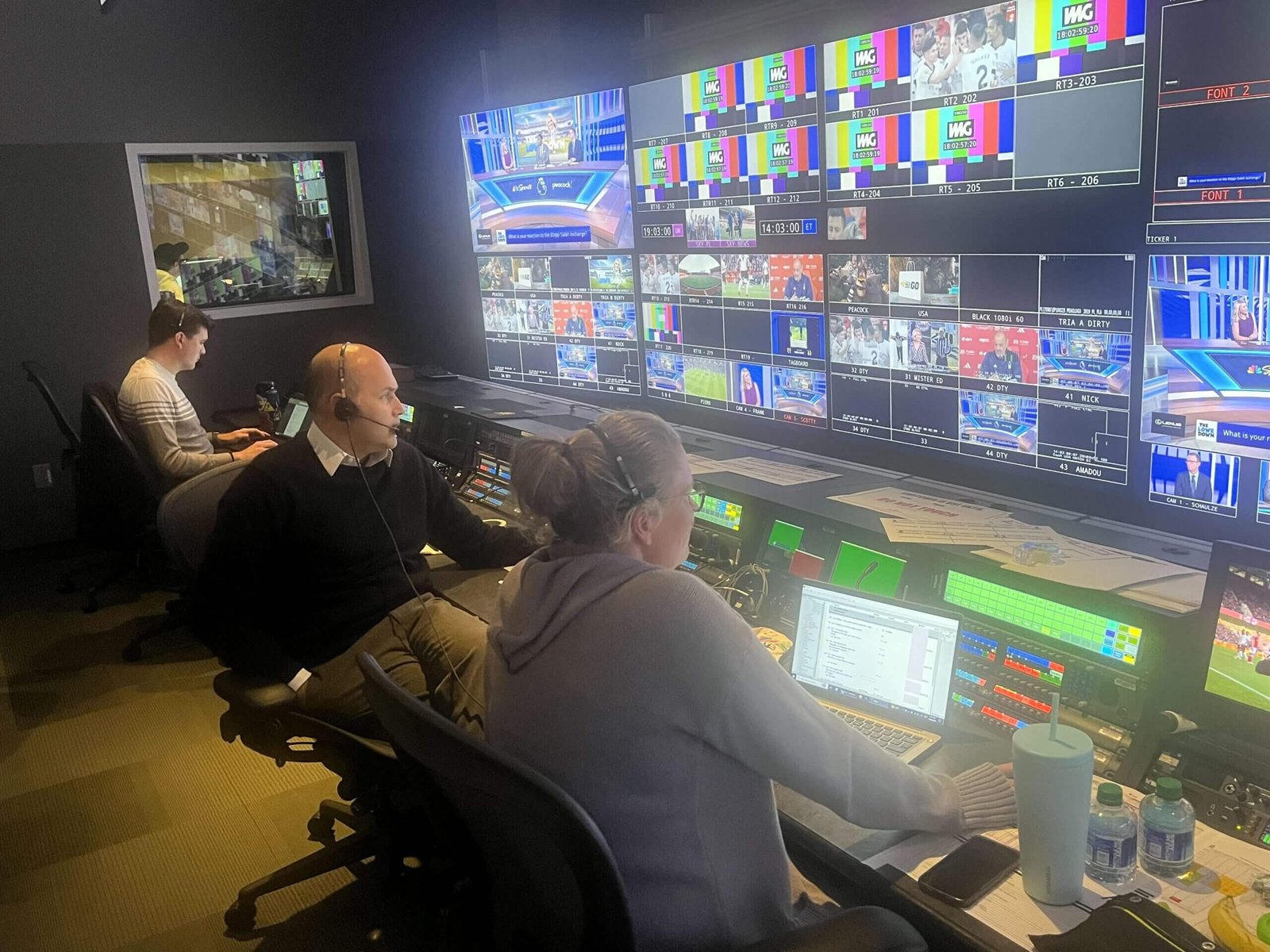
Executive producer Moossa directs coverage (Adam Crafton/The Athletic)
As for the value of those rights, are they brought into question at all when the league’s champions, Manchester City, have been charged by the Premier League with 115 alleged breaches relating to financial misconduct (all of which they strongly deny)? Or when Everton and Nottingham Forest receive mid-season points deductions?
“It doesn’t question the value at all,” Miller insists. “It’s important that the league has gotten their hands around this, and they’re not afraid to impose discipline where they think it’s needed.
“I actually applaud them for the stance that they’re taking, even if it might move a team into a relegation zone or out of a Champions League or Europa League place. I would rather make sure that the league is run fairly, that everybody plays by the same rules.”
In 2021, six Premier League teams looked to break free of those rules and set up a breakaway super league. “Obviously, we had concerns,” Miller says, “All credit to the Premier League. They kept us informed in the loop every step of the way. We had enormous confidence the leadership of the Premier League would be able to navigate it and they did.”
Would it have been deal-breaking for NBC if Premier League clubs had undermined their domestic jeopardy by securing themselves guaranteed entry into a new European tournament?
Miller says: “I don’t know that it would have been deal-breaking but it would have certainly required us to examine what was going on, and see if it in any way frustrated our rights.”
Lowe describes the relationship between the Premier League and NBC as a “joint venture, where we are trying to crack America”.
Moossa adds: “In some ways, we’re missionaries, trying to get everybody to join the Premier League fanbase.”
The fan festivals feel like a different vision of football fandom compared to the tribalism back in England. Moossa says: “This is how Americans celebrate the Premier League. It is not how the English do. We can have Liverpool and United fans arm in arm, celebrating, cheering together. If we did this in England, you need horses to separate the two.”
As for bringing the viewer and supporter even closer to the Premier League, Miller has a few ideas. “Access and audio are key,” he says. “People love to hear what Jurgen Klopp is saying to his team or what he’s saying on the sidelines. I realise there’s got to be some protection against that but those are the kind of things that we’re continuing to push the envelope on, and the Premier League is responsive.
“They’re really good when we come to them with ideas. Far be it for me to try to tell the Premier League what makes a good product — their product is spectacular — but much like we do with the NFL and golf, we constantly have conversations and brainstorm on things that we can do to make the games more appealing.”
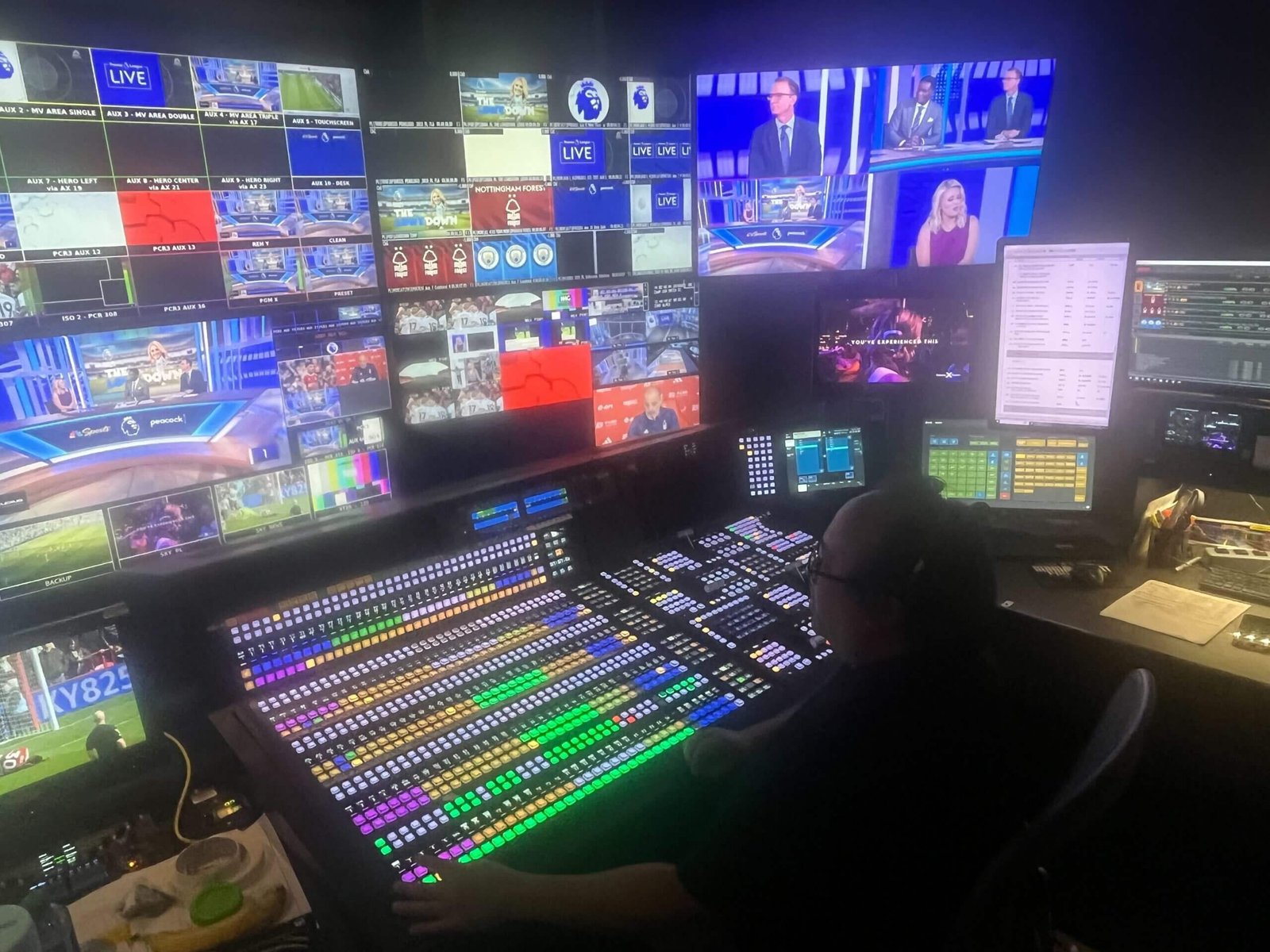
“Buttons” Givens works his magic (Adam Crafton/The Athletic)
Some Premier League clubs have mined new supporters through tie-ups with U.S. stars, or via social media and pre-season tours, but the legalisation of sports betting in more than half of the U.S. states has added another dynamic.
In-play betting odds are forbidden by Premier League rules and Moossa also says he is wary that NBC is producing content for a family audience in the morning hours. Miller says: “Sports betting is becoming more prevalent here in the States. You’d be surprised at the number of the people who will get up on a Saturday morning and say, ‘Burnley is playing Everton — I want to make a bet on this game if I’m going to watch it’, so that can be another reason for them to follow it.”
Need another stimulant? How about the fact there are more than 400,000 Fantasy Premier League managers across the U.S. — a 40 per cent increase since the 2021-22 season.
Last summer, NBC brought the Premier League Summer Series to the U.S., with six teams competing in nine games over seven days across five cities. This summer, NBC is covering the Olympics in Paris but is seeking to bring about another Premier League tournament in 2025 — although it does face resistance from some of the league’s larger clubs, who would rather organise it themselves.
Recently, another possibility has come to light, with world governing body FIFA appearing to step back from its previous position of preventing European leagues taking matches outside its domestic territory. The Premier League has previously tried and failed to take a round of fixtures across the world — the doomed ’39th game’ proposal in 2008. Last week, the league’s chief executive Richard Masters said the door is “ajar” but that it is not in its plans. Would NBC’s Miller support more meaningful access to Premier League action for an American audience?
“Very much so,” he says. “At some point, I would love to see a couple of Premier League games open the season here in big stadiums on our opening weekend.”
Scudamore insists he could foresee the potential of the NBC-Premier League partnership back in 2013 but the pace and impact has surprised even him. He closes with one enduring snapshot of the power and reach of the Premier League in America.
“A few years ago, I flew into into a U.S. airport with a colleague,” he says. “He’d forgotten to bring his visa, so he got marched off to the immigration office and I was with him. They looked at my passport and all of a sudden they said, ‘Are you Scudamore from the Premier League?’. I said yes.
“So we’re in the back of the office and this officer is watching the Man City game on NBC in the immigration office in the U.S. airport. He suddenly started to ask me questions — literally a list of 30 questions about the Premier League. And then he just went, ‘OK, your friend can go!’.”
(Top photo: Adam Crafton/The Athletic)
Read the full article here


